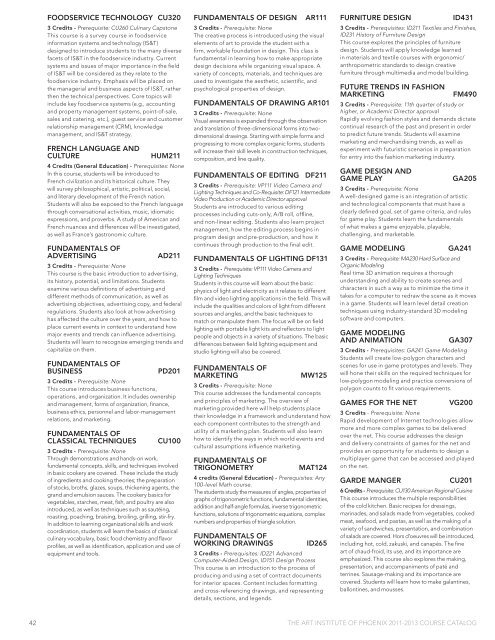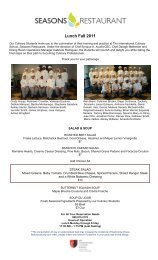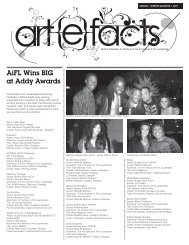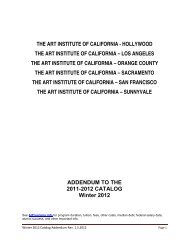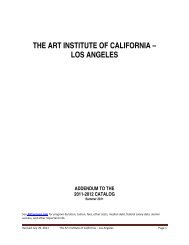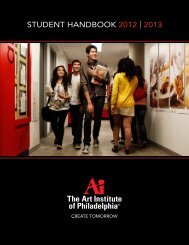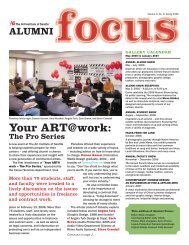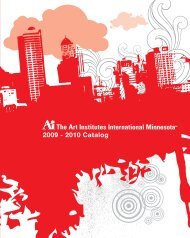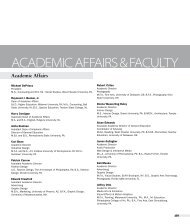2011-2013 CATALOG - The Art Institutes
2011-2013 CATALOG - The Art Institutes
2011-2013 CATALOG - The Art Institutes
You also want an ePaper? Increase the reach of your titles
YUMPU automatically turns print PDFs into web optimized ePapers that Google loves.
42<br />
FOODSERVICE TECHNOLOGY CU320<br />
3 Credits - Prerequisite: CU260 Culinary Capstone<br />
This course is a survey course in foodservice<br />
information systems and technology (IS&T)<br />
designed to introduce students to the many diverse<br />
facets of IS&T in the foodservice industry. Current<br />
systems and issues of major importance in the field<br />
of IS&T will be considered as they relate to the<br />
foodservice industry. Emphasis will be placed on<br />
the managerial and business aspects of IS&T, rather<br />
then the technical perspectives. Core topics will<br />
include key foodservice systems (e.g., accounting<br />
and property management systems, point-of-sale,<br />
sales and catering, etc.), guest service and customer<br />
relationship management (CRM), knowledge<br />
management, and IS&T strategy.<br />
FRENCH LANGUAGE AND<br />
CULTURE HUM211<br />
4 Credits (General Education) - Prerequisites: None<br />
In this course, students will be introduced to<br />
French civilization and its historical culture. <strong>The</strong>y<br />
will survey philosophical, artistic, political, social,<br />
and literary development of the French nation.<br />
Students will also be exposed to the French language<br />
through conversational activities, music, idiomatic<br />
expressions, and proverbs. A study of American and<br />
French nuances and differences will be investigated,<br />
as well as France’s gastronomic culture.<br />
FUNDAMENTALS OF<br />
ADVERTISING AD211<br />
3 Credits - Prerequisite: None<br />
This course is the basic introduction to advertising,<br />
its history, potential, and limitations. Students<br />
examine various definitions of advertising and<br />
different methods of communication, as well as<br />
advertising objectives, advertising copy, and federal<br />
regulations. Students also look at how advertising<br />
has affected the culture over the years, and how to<br />
place current events in context to understand how<br />
major events and trends can influence advertising.<br />
Students will learn to recognize emerging trends and<br />
capitalize on them.<br />
FUNDAMENTALS OF<br />
BUSINESS PD201<br />
3 Credits - Prerequisite: None<br />
This course introduces business functions,<br />
operations, and organization. It includes ownership<br />
and management, forms of organization, finance,<br />
business ethics, personnel and labor-management<br />
relations, and marketing.<br />
FUNDAMENTALS OF<br />
CLASSICAL TECHNIQUES CU100<br />
3 Credits - Prerequisite: None<br />
Through demonstrations and hands-on work,<br />
fundamental concepts, skills, and techniques involved<br />
in basic cookery are covered. <strong>The</strong>se include the study<br />
of ingredients and cooking theories; the preparation<br />
of stocks, broths, glazes, soups, thickening agents, the<br />
grand and emulsion sauces. <strong>The</strong> cookery basics for<br />
vegetables, starches, meat, fish, and poultry are also<br />
introduced, as well as techniques such as sautéing,<br />
roasting, poaching, braising, broiling, grilling, stir-fry.<br />
In addition to learning organizational skills and work<br />
coordination, students will learn the basics of classical<br />
culinary vocabulary, basic food chemistry and flavor<br />
profiles, as well as identification, application and use of<br />
equipment and tools.<br />
FUNDAMENTALS OF DESIGN AR111<br />
3 Credits - Prerequisite: None<br />
<strong>The</strong> creative process is introduced using the visual<br />
elements of art to provide the student with a<br />
firm, workable foundation in design. This class is<br />
fundamental in learning how to make appropriate<br />
design decisions while organizing visual space. A<br />
variety of concepts, materials, and techniques are<br />
used to investigate the aesthetic, scientific, and<br />
psychological properties of design.<br />
FUNDAMENTALS OF DRAWING AR101<br />
3 Credits - Prerequisite: None<br />
Visual awareness is expanded through the observation<br />
and translation of three-dimensional forms into twodimensional<br />
drawings. Starting with simple forms and<br />
progressing to more complex organic forms, students<br />
will increase their skill levels in construction techniques,<br />
composition, and line quality.<br />
FUNDAMENTALS OF EDITING DF211<br />
3 Credits - Prerequisite: VP111 Video Camera and<br />
Lighting Techniques and Co-Requisite: DF121 Intermediate<br />
Video Production or Academic Director approval<br />
Students are introduced to various editing<br />
processes including cuts-only, A/B roll, offline,<br />
and non-linear editing. Students also learn project<br />
management, how the editing process begins in<br />
program design and pre-production, and how it<br />
continues through production to the final edit.<br />
FUNDAMENTALS OF LIGHTING DF131<br />
3 Credits - Prerequisite: VP111 Video Camera and<br />
Lighting Techniques<br />
Students in this course will learn about the basic<br />
physics of light and electricity as it relates to different<br />
film and video lighting applications in the field. This will<br />
include the qualities and colors of light from different<br />
sources and angles, and the basic techniques to<br />
match or manipulate them. <strong>The</strong> focus will be on field<br />
lighting with portable light kits and reflectors to light<br />
people and objects in a variety of situations. <strong>The</strong> basic<br />
differences between field lighting equipment and<br />
studio lighting will also be covered.<br />
FUNDAMENTALS OF<br />
MARKETING MW125<br />
3 Credits - Prerequisite: None<br />
This course addresses the fundamental concepts<br />
and principles of marketing. <strong>The</strong> overview of<br />
marketing provided here will help students place<br />
their knowledge in a framework and understand how<br />
each component contributes to the strength and<br />
utility of a marketing plan. Students will also learn<br />
how to identify the ways in which world events and<br />
cultural assumptions influence marketing.<br />
FUNDAMENTALS OF<br />
TRIGONOMETRY MAT124<br />
4 credits (General Education) - Prerequisites: Any<br />
100-level Math course.<br />
<strong>The</strong> students study the measures of angles, properties of<br />
graphs of trigonometric functions, fundamental identities,<br />
addition and half-angle formulas, inverse trigonometric<br />
functions, solutions of trigonometric equations, complex<br />
numbers and properties of triangle solution.<br />
FUNDAMENTALS OF<br />
WORKING DRAWINGS ID265<br />
3 Credits - Prerequisites: ID221 Advanced<br />
Computer-Aided Design, ID151 Design Process<br />
This course is an introduction to the process of<br />
producing and using a set of contract documents<br />
for interior spaces. Content includes formatting<br />
and cross-referencing drawings, and representing<br />
details, sections, and legends.<br />
FURNITURE DESIGN ID431<br />
3 Credits - Prerequisites: ID211 Textiles and Finishes,<br />
ID231 History of Furniture Design<br />
This course explores the principles of furniture<br />
design. Students will apply knowledge learned<br />
in materials and textile courses with ergonomic/<br />
anthropometric standards to design creative<br />
furniture through multimedia and model building.<br />
FUTURE TRENDS IN FASHION<br />
MARKETING FM490<br />
3 Credits - Prerequisite: 11th quarter of study or<br />
higher, or Academic Director approval<br />
Rapidly evolving fashion styles and demands dictate<br />
continual research of the past and present in order<br />
to predict future trends. Students will examine<br />
marketing and merchandising trends, as well as<br />
experiment with futuristic scenarios in preparation<br />
for entry into the fashion marketing industry.<br />
GAME DESIGN AND<br />
GAME PLAY GA205<br />
3 Credits - Prerequisite: None<br />
A well-designed game is an integration of artistic<br />
and technological components that must have a<br />
clearly defined goal, set of game criteria, and rules<br />
for game play. Students learn the fundamentals<br />
of what makes a game enjoyable, playable,<br />
challenging, and marketable.<br />
GAME MODELING GA241<br />
3 Credits - Prerequisite: MA230 Hard Surface and<br />
Organic Modeling<br />
Real time 3D animation requires a thorough<br />
understanding and ability to create scenes and<br />
characters in such a way as to minimize the time it<br />
takes for a computer to redraw the scene as it moves<br />
in a game. Students will learn level detail creation<br />
techniques using industry-standard 3D modeling<br />
software and computers.<br />
GAME MODELING<br />
AND ANIMATION GA307<br />
3 Credits - Prerequisites: GA241 Game Modeling<br />
Students will create low-polygon characters and<br />
scenes for use in game prototypes and levels. <strong>The</strong>y<br />
will hone their skills on the required techniques for<br />
low-polygon modeling and practice conversions of<br />
polygon counts to fit various requirements.<br />
GAMES FOR THE NET VG200<br />
3 Credits - Prerequisite: None<br />
Rapid development of Internet technologies allow<br />
more and more complex games to be delivered<br />
over the net. This course addresses the design<br />
and delivery constraints of games for the net and<br />
provides an opportunity for students to design a<br />
multiplayer game that can be accessed and played<br />
on the net.<br />
GARDE MANGER CU201<br />
6 Credits - Prerequisite: CU130 American Regional Cuisine<br />
This course introduces the multiple responsibilities<br />
of the cold kitchen. Basic recipes for dressings,<br />
marinades, and salads made from vegetables, cooked<br />
meat, seafood, and pastas, as well as the making of a<br />
variety of sandwiches, presentation, and combination<br />
of salads are covered. Hors d’oeuvres will be introduced,<br />
including hot, cold, zakuski, and canapés. <strong>The</strong> fine<br />
art of chaud-froid, its use, and its importance are<br />
emphasized. This course also explores the making,<br />
presentation, and accompaniments of paté and<br />
terrines. Sausage-making and its importance are<br />
covered. Students will learn how to make galantines,<br />
ballontines, and mousses.<br />
THE ART INSTITUTE OF PHOENIX <strong>2011</strong>-<strong>2013</strong> COURSE <strong>CATALOG</strong>


